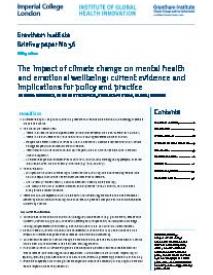The impact of climate change on mental health and emotional wellbeing
This briefing, and accompanying animation, shows how climate change is negatively affecting the mental health and emotional wellbeing of people around the world. It proposes a detailed set of recommendations to stimulate greater knowledge, awareness and action for all sectors including policy makers, research institutions and mental health practitioners.
Headlines
Climate change is negatively affecting the mental health and emotional wellbeing of people around the world. The literature shows that:
- There is a clear relationship between increased temperatures and number of suicides;
- There is clear evidence for severe distress following extreme weather events;
- People who meet criteria for mental illness are more vulnerable to the effects of climate change on physical as well as mental health;
- The climate crisis threatens to disrupt the provision of care for people with a mental illness diagnosis;
- Climate change exacerbates mental distress, particularly among young people, even for individuals who are not directly affected (e.g. ‘eco-anxiety’).
These impacts:
- Will get worse without meaningful interventions, driving and exacerbating health and social inequalities which themselves worsen mental health;
- Are currently ‘hidden costs’, unaccounted for in policy and planning;
- Are likely to be vastly underestimated as despite the serious effects, this has been a neglected area of research
There are win-win opportunities (co-benefits) for improving mental health and emotional wellbeing associated with taking actions to reduce greenhouse gas emissions and adapt to a warming climate.
Key recommendations:
- Establish an international network including key stakeholders (e.g. government, healthcare systems, community groups, academics, emergency responders) to catalyse knowledge-sharing, target research efficiently, and identify and scale up successful interventions.
- Conduct robust, interdisciplinary and collaborative research to fully understand the true impact of climate change on mental health and emotional wellbeing.
- Ensure that the cost of climate change on mental health, and the multiple benefits of climate action are fully considered in the decision-making process.
- Prioritise successful climate mitigation and adaptation actions that have co-benefits for mental health and reducing social inequalities. Such actions could include: improving air quality, providing equitable access to nature and improving the energy efficiency of housing.
- Implement appropriate strategies to manage and reduce the severity of any negative mental health impacts when they do occur.
Geachte bezoeker,
De informatie die u nu opvraagt, kan door psychotraumanet niet aan u worden getoond. Dit kan verschillende redenen hebben,
waarvan (bescherming van het) auteursrecht de meeste voorkomende is. Wanneer het mogelijk is om u door te verwijzen naar de bron
van deze informatie, dan ziet u hier onder een link naar die plek.
Als er geen link staat, kunt u contact opnemen met de bibliotheek,
die u verder op weg kan helpen.
Met vriendelijke groet,
Het psychotraumanet-team.
36 pagina's | London : Grantham Institute
https://www.imperial.ac.uk/grantham/publications/all-publications/the-impact-of-climate-change-on-mental-health-and-emotional-wellbeing-current-evidence-and-implications-for-policy-and-practice.php


